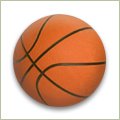 Journal of the International Society of Sports Nutrition, December15, 2008
Journal of the International Society of Sports Nutrition, December15, 2008In an article published earlier this week in the Journal of the Internation Society of Sports Nutrition , researchers from Kingston University in London reported on nutritional supplement use among young (ages 12-21) elite athletes in the United Kingdom.
Athletes take supplements for different reasons: to improve their health, enhance their performance, round out their diet, and increase their energy.
One concern I have is that many young athletes take the wrong supplements, in the wrong amounts, at the wrong times.
In this study, young elite athletes most often reported taking (in descending order) energy drinks, vitamin C, multivitamins, whey protein, creatine, echinacea, caffeine, iron, ginseng, and melatonin. Often, though, they weren't able to correctly match their reason for taking a supplement with the supplement needed to reach their goal .
Take a look at the graph above.
When asked about the source of advice to take three of the most popular supplements (creatine, whey protein and energy drinks) most young athletes reported they took them without advice from others. While it's comforting to see that the second most reported source of advice was their coach, the coaches themselves, while well intentioned, might not be giving out correct advice.
What about health care provider's advice? Nutritionists were the 3rd most common source of advice (after NONE and coaches). Team doctors and general practitioners? Way behind even fellow athletes and friends.
This needs to change. Athletes, especially those who are still growing, need credible, reliable advice on ways to safely optimize their health and performance. Doctors are partly at fault, because most are not up to date with current evidence-based sports nutrition. Hopefully, health care professionals can work to translate the latest research results to the everyday player so that s/he can make informed decisions about what, and what not, to put into their bodies.
Want more information? Just search this blog using the keyword NUTRITION.
You can also get more resources by going back to this blog post.
Looking more critically at the article, it's notable that the response rate (those who sent back their answers) was only 1/4 of the 1,674 athletes who received the questionnaire. For our interests, it's also important to know that basketball players were not studied here ("Game On"?) . I also don't know what constitutes "energy drinks" in the UK (are they hydration drinks, recovery drinks or something like Red Bull - ugh). I've asked the lead author to answer this last question. Will let you know when I do.








1 comment:
I think that's true. I've tried the natural remedies and supplements available at Rainbow Wellbeing (www.rainbowwellbeing.com) and found them to be quite effective!
Post a Comment